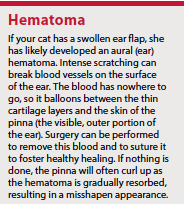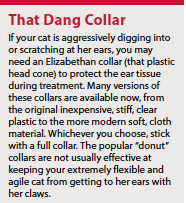Instead of lying quietly curled up on your lap, your cat is shaking her head and scratching and digging at her ears. You look in her ears and see what looks like coffee grounds, indicators of the most common cause of ear itching in cats—the dreaded ear mite.
Scientifically known as Otodectes cynotis, ear mites are estimated to cause 85% of cases of feline otitis externa (inflammation of the external ear canal), according to the Companion Animal Parasite Council. These mites live in the external ear canal and infestations can be easily shared among cats and dogs in the same household. However, they may be found all over the head and neck of some cats, generally causing a mild dermatitis as well as the otitis.
“If your cat is having ear problems, it is important to see a veterinarian as soon as possible because cats go from zero to 60 very quickly, and they can cause a lot of self-trauma/damage with their very sharp claws,” says Julia E. Miller, DVM, assistant clinical professor of dermatology at Cornell University Hospital for Animals. Cats with a heavy infestation of mites may head tilt and have bleeding wounds from scratching the ears. Secondary bacterial infections may develop where the ear tissue is damaged, leading to a purulent discharge.
To treat ear mites, your cat needs her ears gently cleaned, removing as many mites as possible. Treatment options include ear drops or the use of topical parasite medications that kill ear mites as well as fleas and ticks. Dr. Miller says that, in her experience, over-the-counter products marketed to treat ear mites are usually not very effective and can cause more inflammation in the ear canal.
All the household pets should be treated to be sure you catch all the mites. Secondary bacterial infections may require topical or oral antibiotics. Ears should be gently wiped to clean out debris before any medication is applied. Check with your veterinarian for a gentle, safe ear-cleaning solution.
More Causes
Inflammatory nasopharyngeal polyps may be the cause of head shaking and ear scratching in young cats. Sometimes these polyps can be seen via an otoscopic exam, but an exam under anesthesia and radiographs may be necessary. Surgical removal is the treatment of choice.

Food allergies are often associated with itching, rubbing, and scratching of the face and ears in affected cats. This is different from food intolerances, which tend to be associated with gastrointestinal signs. Food allergies are almost always due to protein sources in a cat’s diet, which usually means that beef, fish, chicken, and dairy products are the causative agents.
To properly diagnose food allergies, your cat should be placed on an elimination-diet trial, which means systematically trying different protein sources to see which stimulates the itch response. While on these diet trials, your cat must stick to that diet faithfully, with no added treats or other protein sources being fed. Treatment might be as simple as changing to a different flavor of your cat’s favorite foods, or it might mean consulting a veterinary nutritionist to make up a unique diet for your cat.
Contact dermatitis, which is a skin reaction to an external substance of some type, can lead to ear inflammation and soreness. The current trend toward dermal medications that are placed on the inside of a cat’s ears can be a lifesaver for some cats and their families, but other cats may develop reactions like contact dermatitis.
lead to ear inflammation and soreness. The current trend toward dermal medications that are placed on the inside of a cat’s ears can be a lifesaver for some cats and their families, but other cats may develop reactions like contact dermatitis.
“Cat ears are VERY sensitive, and I often see topical reactions to a variety of ear medications,” says Dr. Miller. “Sometimes just stopping the ear meds, flushing the ear canal, and giving the cat’s ear a rest is the key to solving the problem. I always tell vets and owners to be very cautious and conservative about what you put into cat ears.” This caution extends to drops used to treat an infection as well as the topical drugs.
Less common causes of ear scratching include foreign bodies and tumors. Seeds, bugs, plant material like foxtail awns, and small household items like pills can all potentially end up down in your cat’s ear canal. Many of these objects can be flushed out of your cat’s ear or carefully removed with a hemostat or forceps by your veterinarian. Short-acting anesthetics may be required to keep your cat still.
If a tumor is found in your cat’s ear, the most common are squamous cell carcinomas. Cats with white ears who go outdoors and have direct sun exposure are the most susceptible to developing these cancers. For these tumors, surgical removal is the treatment of choice, with follow-up therapy if needed.




